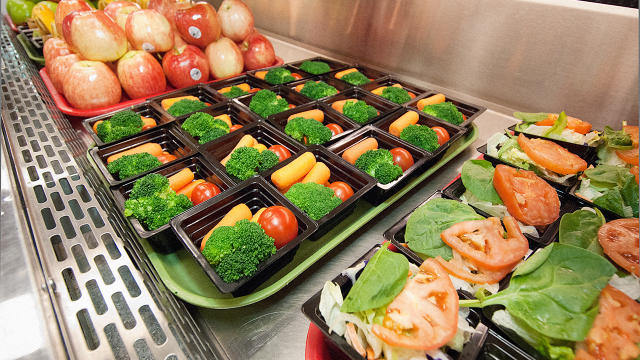Just a small reduction in the amount of meat per school lunch has enormous environmental effects.

For the past two years, school lunches at the Oakland Unified School District have been a little different. As part of a study to find out if reducing the amount of meat and cheese in school meals would affect climate change, the students were served meals modified with just one-third less meat than before. And the results were impressive: Not only was the district’s carbon footprint reduced significantly, but there were also huge savings in cash and water.
For the study, environmental advocacy group Friends of the Earth (FoE) worked with the Oakland schools to reduce meat and dairy, and to asses the impact of this reduction on the carbon and water footprint of the entire district’s meals. During the two-year period of the study, schools reduced their purchases of animal products by just 30%, leaving enough meat for even the most militant carnivores, and yet managed a reduction of 14% in carbon. For the district as a whole, that translates to around 660 tons of CO2 saved per year, or, says the FoE report, “the equivalent of driving 1.5 million miles less per year.”
But there are many more benefits. For example, water use—the water required to produce the animal products—was reduced by 6%, or 42 million gallons. That’s a staggering seven gallons per meal saved just by cutting animal products by a third.

Cutting out meat also saves money. The district as a whole saved $42,000, which equates to a 1% reduction in spending per meal. That alone isn’t such a big figure for an entire school district, but it includes the additional money spent on fruit and vegetables to replace the meat and cheese. In fact, schools purchased 10% more fruits, vegetables, and legumes, which translates to a healthier diet for all involved.
If every K-12 school in California did the same as the Oakland Unified School District, it would reduce CO2 emissions by over 88,000 tons, “equivalent to eliminating the emissions from 17,000 cars that drive almost 200 million miles per year,” says FoE. If every school in the U.S. followed the plan, it would be like taking 150,000 cars off the roads each year.
And what starts in schools could make its way across other parts of our lives. “While our study focused on school food, it’s clear that meat and cheese reduction is a powerful climate mitigation strategy for all restaurants and institutions that want to reduce their environmental impact.”
Source: Co.Exist




